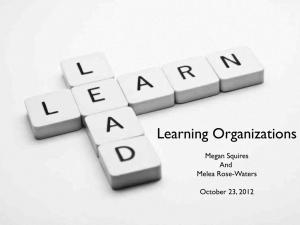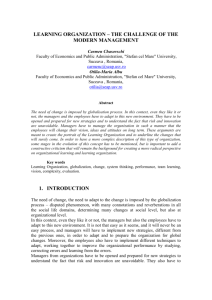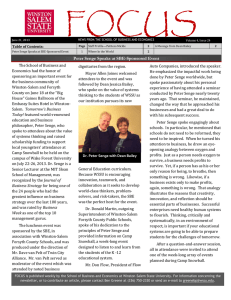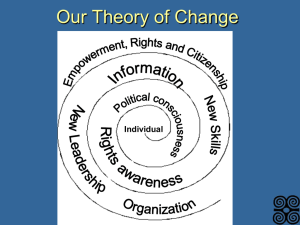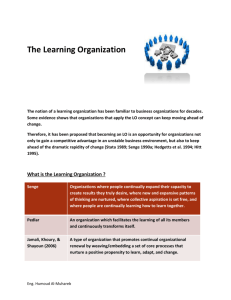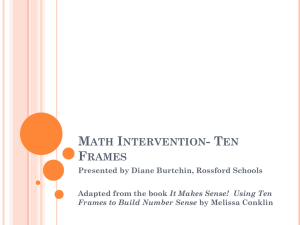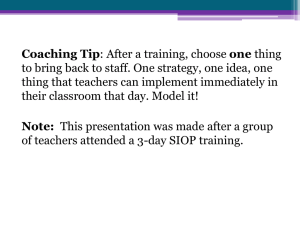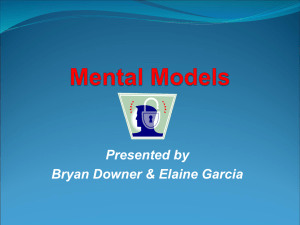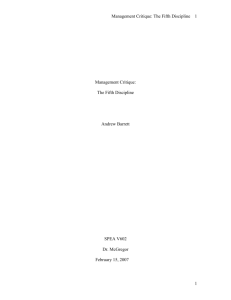Posters_on_Learning_.. - Learning Organization Practitioners
advertisement
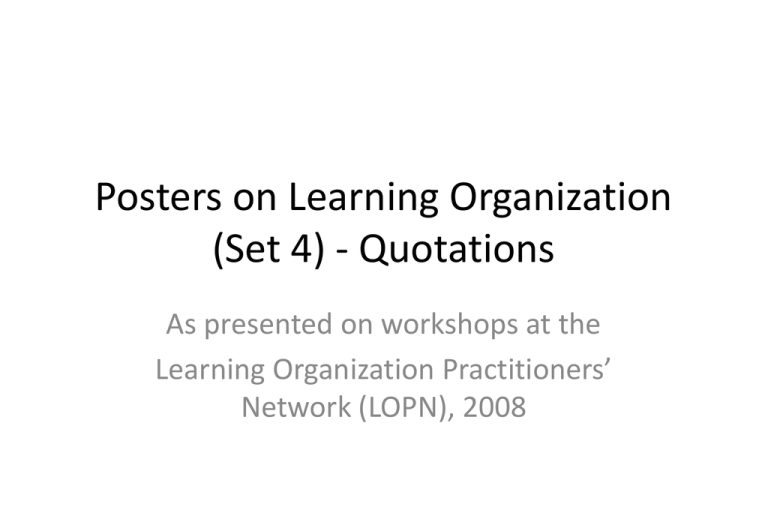
Posters on Learning Organization (Set 4) - Quotations As presented on workshops at the Learning Organization Practitioners’ Network (LOPN), 2008 QUOTATIONS “Systemic insights, coupled with inquiry and dialogue are the corner stones of adaptive learning organizations and teams.” Peter Senge “When placed in the same system, people however different, tend to produce similar results. The system causes its own behaviour. The systems perspective tells us that we must look beyond individual mistakes or bad luck or personalities and events to understand important problems. We must look into the underlying structures which shape individual actions and create the conditions where types of events become likely.” Peter Senge “Success of the beer game requires a shift of view for most players. It means getting to the heart of fundamental mismatches between common ways of thinking about the game – our mental models of it - and the actual reality of how the game works. Most players see their job as "managing their position" in isolation from the rest of the system. What is required is to see how their positions interact with the larger system.” Peter Senge “The frog’s internal apparatus is geared to sudden changes in his environment, not to slow, gradual changes. Learning to see slow, gradual processes requires slowing down our frenetic pace and paying attention to the subtle as well as the dramatic. The problem is our minds are so locked in one frequency, it’s as if we can only see at 78 rpm; we can’t see anything at 331/3. We will not avoid the fate of the frog until we learn to slow down and see the gradual processes that often pose the greatest threat.” Peter Senge “The term structure does not mean the “logical structure” of a carefully developed argument or the reporting “structure” of an organization chart. Rather “systemic structure” is concerned with the key interrelationships that influence behaviour over time. They are not interreationships between people but among key variables, such as population, natural resources, and food production in a developing country or engineer’s product ideas and technical and managerial know-how in a high-tech company.” Peter Senge “There is a deep tendency to see the changes we need to make as being in our outer world, not in our inner world. The central message of “The Fifth Discipline” is more radical than “radical organization design” – that our organizations work the way they work, ultimately because of how we think and how we interact. Only by changing how we think can we change deeply embedded policies and practices. Only by changing how we interact can shared visions, shared understandings, and new capacities for coordinated action be established.” Peter Senge “Being proactive is frequently seen as an antidote to being “reactive”. All too often, “proactiveness” is reactiveness in disguise. If we simply become more aggressive fighting the “enemy is out there”, we are reacting – regardless of what we call it. True proactiveness comes from seeing how we contribute to our own problems. It is a product of our way of thinking, not our emotional state.” Peter Senge “The last step towards our vision is “letting it go”. Vision is the “food” for our sub-conscious. The subconscious can handle any amount of complexity and translate our visions to reality. All it needs is a very clear compelling picture. Take all the time to make the picture clear. Letting go is the act of releasing the vision from our conscious reality to our subconscious. When we don’t let it go, visions reduce themselves to strategy and then it becomes less powerful.” Sheila “When we uncover our frames (mental models) and discover our own frames it has a way of ‘releasing us from its grip”. Our frames fizzle way and loses its power on us. This is a powerful step forward in reducing our defensive attitudes towards the world we live in and to begin the journey of exploring systemic wholeness of many of the deep-seated challenges we face in the world today. The only problem in making that happen is our fears (of rejection, failure and death). It gets in the way of uncovering our frames because if we did uncover our frames, “fear cannot do its work”! This often means not being able charge ahead of the world. So we continue our journeys in life oblivious to our frames yet these frames rule us and the world we live in.” Sheila “Values (honesty, integrity, loyalty, love, hate, good, bad, right, wrong etc.) are judgments we hold on to (on our ladders of inference) when we lose sight of systemic wholeness and don’t see and understand the whole story. Then it is the only thing we are left with.” Sheila “Nothing happens by accident. Everything has a reason. The less we stay around to see the whole story, “accidents” (crisis, chaos, downfalls, declining sales, etc.) continue to happen and worsen the very results we seek to create! We don’t see the erosion. We see that we did not get what we want.” Sheila “Systems Thinking is stepping back (to see the patterns over time and their underlying structures). Before that happens however, we need to let go of the events and the frames we have become attached to. ” Sheila THE END

